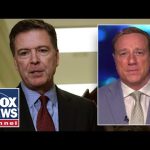In a world where tensions seem to escalate daily, the ongoing conflict between Ukraine and Russia continues to capture the attention of many. Recently, a discussion highlighted the challenges and the stark realities both nations face amidst this turbulent time. It’s a battle that has already cost countless lives, and yet, some experts believe the end could be nearer than we think, as one notable political figure has publicly questioned the military might of Russia’s President, Vladimir Putin.
President Donald Trump did not hold back when discussing his impressions of the conflict. He expressed clear disappointment in Putin’s tactics and strategies. Despite Russia’s heavy investment in weaponry and military resources, Trump mused that they appear to have gained little to show for all their efforts. He believes it may be time for Russia to reconsider its ongoing aggression and reassess its losses, which suggest a sing of weakness rather than strength. In Trump’s eyes, facing off against Ukraine has not proven successful for Russia, leading to speculation about a potential shift in the power dynamics between the two nations.
This sentiment was echoed by NATO Ambassador Kurt Volcker, who spoke about the unyielding spirit of the Ukrainian people. He emphasized their determination as they fight to protect their lives and families. Despite the ongoing challenges, including bombings that terrorize civilian populations, Ukrainian resilience shines through. In fact, the morale among Ukrainians appears to be bolstered by recent assurances from Trump about the nature of Russia’s struggles on the battlefield. According to Volcker, Trump’s optimistic assessment has infused new hope into the hearts of the defenders.
However, there have been mixed signals regarding peace efforts. While Ukrainian President Volodymyr Zelenskyy has frequently indicated a willingness to negotiate and seek a cease-fire, questions remain regarding Russia’s commitment to such discussions. Past encounters indicate that Putin might not have genuine intentions for peace, as he reportedly sidesteps opportunities for dialogue. It seems that every attempt for a peaceful resolution is met with more aggression rather than cooperation, leaving many to speculate that Putin is more interested in prolonging the conflict.
Not all actions from Russia can be deemed equal, as recent reports clarify the stark differences in warfare tactics. The Ukrainian forces are primarily focused on military targets, seeking to minimize civilian casualties, while Russia allegedly targets civilian infrastructure, leading to widespread chaos and fear among the population. This disparity in tactics has not gone unnoticed, with many calling for a more robust response from global powers to support Ukraine in its defensive efforts against such atrocities.
As discussions about sanctions linger in the air, Volcker suggested that the current sanctions against Russia may need a strategic overhaul. Russia’s ability to adapt to initial sanctions has raised eyebrows, indicating that not enough is being done to cripple the resources that keep its military operations afloat. It might become increasingly essential to target specific businesses and supply chains rather than imposing blanket tariffs, which could risk backfiring. It’s a delicate dance of diplomacy and strategy that continues to unfold on the world stage, as allies weigh their options in this ongoing struggle between good and evil. As the situation develops, it leaves many to wonder what the future holds for both nations and whether peace can indeed be achieved in the midst of such darkness.




